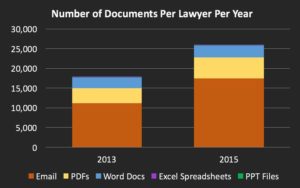
Everywhere we’re hearing about the “data deluge,” the “information tsunami,” and “information overload.” Which makes us wonder—How is this hitting the legal profession? And, what are the numbers?
Because MetaJure customers have a unique view of 100% of their documents and information, we talked to several of them about quantifying their data. The results were astounding.
How many documents?
By the end 2015, attorneys on average were creating or receiving more than 70 documents every day (and for some, many more). That includes emails, email attachments, Word documents, Excel spreadsheets, PDFs, client records, opposing counsel records, etc. That’s more than 26,000 documents a year!
But, that’s not all. Just two years ago, an average lawyer managed fewer than 18,000 documents annually. That’s a 50% growth rate just between 2013 and 2015. Not surprisingly, email communication and email habits are partly responsible for this growth. Lawyers went  from managing approximately 11,000 emails in 2013 to more than 17,000 in 2015. The other factor is PDFs. As clients have gone electronic, so have their records, including the records delivered to or received by their counsel. In 2013 the average lawyer dealt with 3,817 PDFs. By 2015, they handled 5,349.
from managing approximately 11,000 emails in 2013 to more than 17,000 in 2015. The other factor is PDFs. As clients have gone electronic, so have their records, including the records delivered to or received by their counsel. In 2013 the average lawyer dealt with 3,817 PDFs. By 2015, they handled 5,349.
No wonder so many lawyers feel overwhelmed! But data is only part of the problem.
We’re in a Perfect Storm
What’s more, the number of support staff per attorney – the people we used to depend on to file and find information –has plummeted, while clients are demanding more efficiency and more services to be delivered on-demand. It’s a profession’s Perfect Storm.
Technology got us into this problem and it can get us out
Despite good intentions, today’s DMS offerings aren’t helping. Some of us still remember the 1980s – the world of paper. Back then lawyers touched around 80 documents/week or approximately 16 every day. That’s around 4,000 letters and contracts, telephone message slips and legal pad notes of client telephone calls every year. Computers, email, mobile technology, and online collaboration have changed all that. But our systems for managing the information just haven’t kept up.
Requiring attorneys to create agreed-upon filing structures (taxonomies), forcing them to save every document into a system and then asking them to manually tag and label that document or email (oftentimes with data fields that don’t fit) just doesn’t work anymore. We’ve needed a new paradigm for a long time. Finally, technology is providing one.
Outside the legal profession, sophisticated technology is doing much of the work of managing information for us. Take, for example our iPhones. Using information the technology can detect, they automatically label the locations and people in our photos. Or consider the Internet. Search engines manage and find information at the click of a button.
We believe that document management systems can and should do the same. And the reality is that they can. That’s what MetaJure is all about.
_____________________________________
Many lawyers have approached the data overload problem with a number of mistaken beliefs. MetaJure Founders Kevin Harrang, Esq. and Marty Smith, Esq. recently addressed these misunderstandings, presented statistics, and provided five tips for successfully managing the information tsunami at Lawyernomics. Download a full summary of their presentation here.


